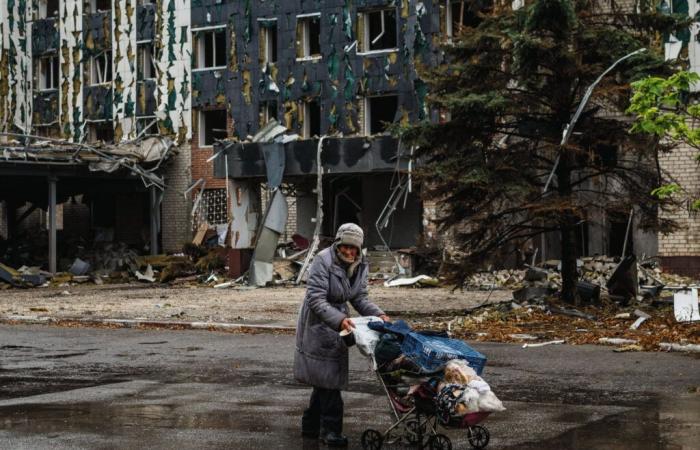During the summer, Ukraine, which was experiencing military difficulties with Russian successes in the Donbass, suffered another setback. The 1is August, the S&P agency downgraded its rating: “selective default”, one notch from payment default. Fifteen days later, it was Fitch's turn to lower Ukraine's credit rating from “C” to “restricted default”.
The criticism? The Ukrainian authorities have been unable to repay part of the long-term debt while the country has been in the middle of war since the Russian invasion on February 24, 2022. The destruction of energy infrastructure is slowing down factory production and pushing part of labor initially.
After several weeks of negotiations, Ukraine obtained a restructuring of 20 billion dollars of international bonds in September. One of the main backers, the International Monetary Fund, had stipulated that depreciation was necessary to make debt levels sustainable.
The objective of the Ukrainian authorities remains a significant relaxation for powerr “borrow again on international financial markets”, explained Ukrainian Finance Minister Serhiy Marchenko. Ukraine ensures “maintain the budgetary stability necessary to continue financing (its) defense”he added.
Growth dependent on conflict
In the space of twenty years, two other phases of restructuring have already taken place. The first with the crisis of 2008, under the leadership of the IMF and the liberals. The second comes after the popular protest movement on Maidan Square in 2013-2014. Against a backdrop of economic partnership with Europe to the detriment of Russia, a political and economic crisis had broken out, extending into conflict in Donbass and Crimea.
It generated two years of recession, an industrial base devastated by the conflict, a currency which lost nearly 70% of its value against the dollar, inflation close to 35%. In exchange for financial aid, the IMF and the European Union have demanded privatizations, budget cuts and openings of capital to foreign companies in the energy field.
After a 29.1% collapse in GDP in 2022 and 5.3% growth in 2023, Ukraine, according to IMF forecasts, is expected to achieve 3% growth in 2024, with inflation projected at 9 %. “Economic growth in Ukraine is expected to slow in the second half with Russian attacks on energy infrastructure and lingering effects of the war on the labor market and business expectations”estimates the organization. The latter forecasts economic growth of 2.5 to 3.5% for 2025.
Steel products, energy (electricity, gas) and the suspension of customs duties or their adjustment favored Ukrainian exports (eggs, poultry, sugar, corn and honey) to the EU. This trade recovery and the increase in national military production supported growth. But it is dependent on conflict. Likewise, steel production (10% of GDP before 2022), which remains crucial for the country's economy, fell from 21.4 million tonnes in 2021 to 6.2 million in 2023 with the destruction.
Ukraine's economic potential is based on strategic mineral deposits worth billions of dollars, such as uranium, titanium, lithium and graphite and extremely fertile wheat lands. If 80% of the territory remains away from intensive fighting, most agricultural and industrial regions (coal, steel, etc.) are rendered inoperable by mines and unexploded munitions.
Creditors eye reconstruction
Reconstruction, the next step for Ukraine, is of great interest to the main creditor groups: Germany, Canada, France, Japan, Great Britain and the United States. The World Bank recently estimated its cost at nearly $500 billion. The country will have to fight against poverty which has more than quadrupled. One in three families is now food insecure.
According to the British magazine “The New Statesman”, which has just published an article on “the neoliberal battle for the reconstruction of Ukraine”, the CEO of BlackRock, Larry Fink, declared that the recovery of the economy after the war could become “a beacon to the rest of the world as to the power of capitalism”. Not only would this reconstruction mean commercial opportunities, but it would represent an ideological opportunity.
“If Western political leaders saw the war in Ukraine as an opportunity to reinvigorate EU and NATO enlargement, Fink and his ilk saw it as an opportunity to revive a waning faith in capitalism.”écrit « The New Statesman ».
Faced with these vultures, Ukrainian unions are ready to fight. The president of the Confederation of Free Trade Unions of Ukraine (KVPU), Mykhailo Volynets, is already warning: “Every day, workers see their wages frozen while the number of hours does not decrease and taxes and prices increase. With long-term reconstruction, the inalienable condition is respect for workers' rights according to the standards and conventions governed by the ILO. »
The media that billionaires can't afford
We are not funded by any billionaire. And we are proud of it! But we face ongoing financial challenges. Support us! Your donation will be tax-free: giving €5 will cost you €1.65. The price of a coffee.
I want to know more!






